#study and analysis
Explore tagged Tumblr posts
Text
Ralsei has known what's been going on with Kris the ENTIRE time, and once you realise that, EVERYTHING he says and does around them makes a thousand times more sense. And you realise that, far from dismissing Kris's "true" self in favour of a copy, he has been working tirelessly to prop them up, to validate their most basic and fundamental choices, to keep them from the brink of despair, and perhaps even death.
We always thought it was strange, how Ralsei seems to baby Kris at times - how he offers heaps of praise upon them for performing the simplest of tasks, how he lets them express themself through violence while chastising Susie for the same thing, how at every turn he puts so much emphasis on Kris's choices, their talents, their intrinsic personhood, almost above the very prophecy he serves. We thought him mollycoddling and completely out-of-touch at best, and downright malicious at worst. We presumed he was encouraging the player to keep playing, and was in fact speaking over Kris's head directly at us. We presumed that the prophecy was all he cared about, and him encouraging Kris was simply a means to that end.
And we were wrong about all of it. Because we didn't know what Kris was truly going through until now. We thought that our possession was the worst thing that was happening to them, and that he was complicit in their suffering by trying to downplay it.
But Ralsei knew. Because Ralsei knows Kris better than anyone else - better than Susie, better than Noelle, and certainly far better than us.
Kris is hopelessly trapped, at all times. There is no hope for them, they cannot see a way to escape their bonds... not alive, in any case. Their suffering is so great, the pressures upon them so immense, that they have been hollowed out into a catatonic shell of their former self - unable to move except through great effort, unable to speak except through stilted phrases. They don't sleep or eat well at all. They don't try at school. They cannot tell anyone about what's happening, and they cannot make friends because of it. For all intents and purposes, they have given up.
But it's worse than that, because they KNOW that what they're being made to do is wrong. They don't want to do any of it, and yet they feel they cannot refuse. That knowledge eats away at them, to the point where they feel like they are inherently Bad, because only Bad people do Bad things, and they're doing Bad things all the time. They don't feel like they deserve the good things in their life because of it. They feel like they're living a lie. And no-one else knows - no-one else can possibly know.
But Ralsei knows.
Why does Ralsei go to the trouble of arranging a tutorial battle for Kris, when they've already demonstrated their capabilities fighting against Lancer? Because Kris doesn't know what they're doing during that fight. They're issuing commands, fighting alongside Susie, and they don't know how or why. They're scared, they don't know where they are, and the one other person they knew from school just ditched them. Through the tutorial, Ralsei breaks down each combat function step-by-step, walking Kris through each one with patience and restraint. And he lets them go off-piste up to a point - he'll let them attack his mannequin and say it's alright if they want to hit him too, he'll let them hug him several times throughout the tutorial, and he will show remarkable restraint throughout the entire endeavour, despite his obvious frustration at their uncooperativeness.
Seen this way, the Tutorial becomes less about the GAME teaching the PLAYER how to battle, and more about RALSEI providing to KRIS some semblance of structure and context to a new and frightening world. Both of them are literally starting at Zero, and have to establish the basics before anything further can happen.
This in turn establishes the framework for their relationship - not an annoying tutorial fairy lecturing an experienced player on things they already know, but a kindly tutor gently guiding a broken teen, one tiny step at a time. Not lashing out at mistakes, not admonishing when they try to assert themself against the established framework - he will let them fight, and let them command him to fight as well, because his desire to help Kris find themself again means he has to provide leeway for if they "misbehave". There have to be bounds, but they must feel like the choices they make matter - even if they actually don't.
When you're drowning in a world that has seemingly conspired to take your agency from you, and break you down into nothing more than a pawn that does what it's told and nothing else... even the illusion of choice is a life-preserver that you'll cling onto for dear life. The support Ralsei provides Kris in this capacity is what gives them the drive to protect Susie from King's attack - to make a choice to protect their friend, even if it wouldn't have meaningfully changed anything.
It explains his secret conversations with Kris too - while we are busy watching Susie, Ralsei is free to let Kris know that despite being literally controlled, the one controlling them is on their side, and that we will help them break free from the more insidious influence of the Knight. He has to tell them to trust in us, trust that we will do right by them to the best of our abilities. And indeed, by Chapter 2, they have become more willing to express themself through their tone of voice, through how they choose to interpret the instructions given to us, either to play pranks or to show their appreciation for the people who, despite everything, still care for them.
And even Ralsei's apparent dismissive attitude to Spamton NEO's effect on Kris can be explained through this prism. Kris is very very slowly starting to recover from the trauma of their situation, and literally EVERYTHING about Spamton is a huge trigger for them. It's not farfetched to say that Kris sees in Spamton a cautionary tale of how they will end up - used up, cast aside, wretched and desperate and bitter and broken. All of Ralsei's work building Kris back up could be undone in an instant, and so he has to tread extremely carefully - downplay its significance, offer nonthreatening proximity (he will hug Kris, but only if they hugged him on the boat ride prior to this), distract them from the immediate trauma with very basic "nice" thinks like cake, and warm/soft things. It seems dismissive at the time because we don't yet know what Spamton truly represents to Kris - not just the fear of being controlled against your will, but of being used up and broken down, and then tossed away like an unloved toy. It's only when we have that additional context that all of Ralsei's actions towards them start to make sense - not only make sense, but also show a level of care and tact that we did not previously assume him capable of.
And I suppose the last question is: why does Ralsei do any of this in the first place? Why go to this trouble when he knows he'll just be left behind, when he knows that if he succeeds, Kris will go back to the light world and live a full life without him? Well... look at the colour of his horns. If Ralsei is the horned headband, and Kris wore him for months, he would have borne witness to Kris's deepest, darkest fears about themself. It's possible that he might have seen the inciting incident that led Kris down this unfortunate path. Either way, he would have been so close to them that he'd almost be like an extension of them.
So, again - why does he do this? Because his purpose was always to guide them back to themself - first as a pair of horns to better fit in with their family, and then as a physical manifestation of those same horns to help them overcome the terrible harm that has been wrought upon them.
But more than this, I think it's because he loves them - the same way that they would have loved him when they wore him all those years ago. And isn't that what you do for the people you love - help them when they're struggling, comfort them when they're sad, gently challenge them to expand their window of tolerance, give them the tools they need to return to the light, to heal and grow back into themselves?
Ralsei knows Kris better than anyone else. And maybe we should start listening to him.
#deltarune#deltarune spoilers#ralsei#ralsei deltarune#kris dreemurr#kris deltarune#character study#deltarune analysis#patchworkthinks#long post
2K notes
·
View notes
Text
"Caitlyn never verbally apologized" no, she did so much more than that.
She betrayed Ambessa. She let Jinx go. She led the battle against Ambessa in the finale. She lost an eye and nearly died. She gave up her seat on the council to Sevika so that Zaun could be represented.
Does it fix everything? No. Systems of oppression aren't fixed with a handful of well intentioned actions.
But Caitlyn DID feel remorse and DID make attempts to reverse her wrongdoings.
Did you want Caitlyn to change, or did you just want her to be punished?
#caitlyn kiramman#arcane#arcane thoughts#arcane analysis#arcane discussion#arcane discourse#character study#character analysis#arcane character analysis
3K notes
·
View notes
Text
As someone who loves animated tv and movies I can say with certainty that the way arcane uses micro expression is so special.
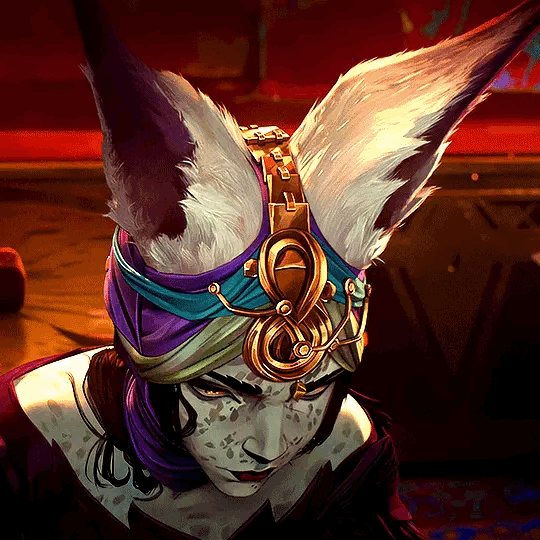

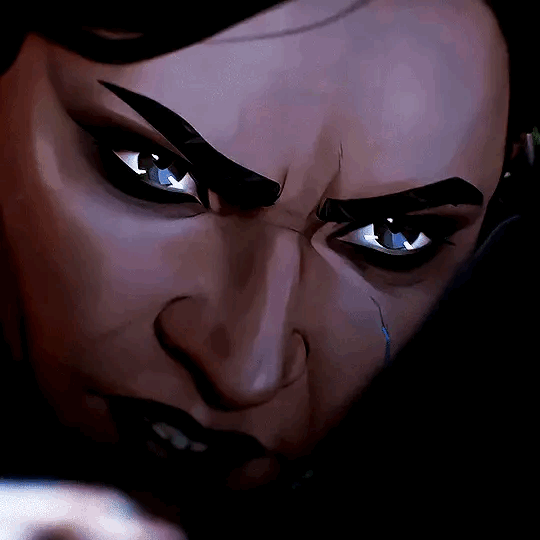
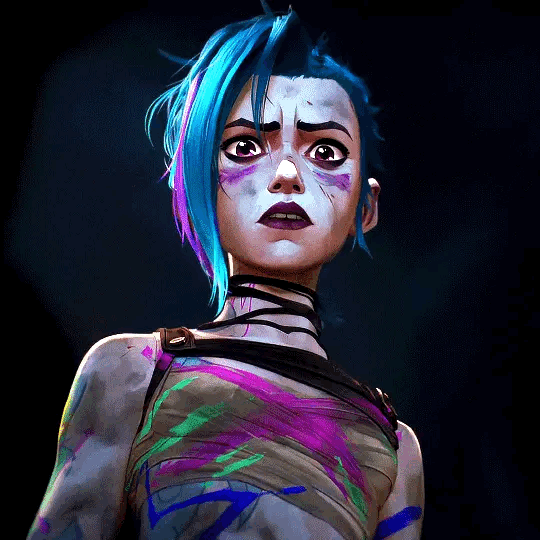
The animation of expressions is simplified in most media for obvious reasons but when arcane animates expression they seem to actually take advantage of the ability to animate each frame to really detail these micro expressions.
They add so much depth to the characters and the story in my opinion. Allowing for the audience to see the conflicting and underlying thoughts and emotions behind a characters actions.
Movement in the ears, eyebrows, lips, jaw, flickering of the eyes or eyelids. Even the way a movement can be faster or slower, halting or assured. All of it tells the story of what the character is going through or thinking better than words can.
This is why I don’t really think much about the arguments that revolve around “they never explicitly talked about this, or apologized, or gave forgiveness etc” cause it’s the little things arcane shows visually like these micro expressions which paint a much more complex picture that doesn’t need words to communicate.


#all gifs are from arcanegif#there’s so many more amazing ones of the micro expressions I could watch all day#arcane#animation#arcane animation#caitvi#artistic expression#character design#character art#character study#vi#jayce arcane#jayce talis#ekko arcane#jinx arcane#timebomb#lest arcane#savika arcane#jinx#mine#thoughts#arcane analysis
2K notes
·
View notes
Text
Something so underrated about Eva Tsunaka is how incredibly egotistical she is. It flies under the radar most of the game, probably because she’s paired with Damon “my talent is better than your talent” Maitsu for most of it, but I would say she’s actually MORE egotistical than Damon is, it’s just easier for us to see Damon’s ego since he’s the protagonist and we can access his inner monologue.
Yes, Damon is definitely egoistic but there’s some logic behind it. Damon has a philosophy of talents needing to be useful, and it’s only when those talents don’t meet his standard that Damon gets an ego. When it’s people like Wolfgang with ‘useful’ talents, or just of use to him in general, Damon tends to demonstrate a lot of respect. He is capable of seeing others as his equal.
Eva, however? She respects nobody but herself, not even Damon. Absolutely nothing is ever her fault, it’s everyone else’s fault because she can’t accept they matched her intelligence, something her ego is rooted in as the Ultimate Mathlete. She “deserves to live”, as though she was the exception to the rules of the Killing Game and was above punishment. She bluntly calls her fellow students and their ideas stupid. When Damon notices the doorknob in the boiler room has been flipped, but only after the fact, Eva remarks that she “would have noticed in the moment”, and she rubs that in too. She needed to assert herself as more intelligent than her only friend. This particular example is crazy too considering Eva changed the doorknob herself! I sure hope she would have noticed it was switched!
So much of Eva’s self worth is rooted in needing to be better than everyone else, and unlike Damon she’s not willing to accept being equals. She has to be better, or else she’s nothing.
#damon maitsu#eva tsunaka#Eva Tsunaka the woman you are#project eden's garden#p:eg#p:eg chapter 1#project edens garden#project eden’s garden ch1#project: eden's garden#pjeg#character study#character analysis#eve’s ramblings
1K notes
·
View notes
Text
I just had more thoughts about Mickey 18!!!
I feel like this Mickey was different in the way he was able to process grief, guilt, and self worth, and that he was able to see he was worthy of being treated as a human rather than a passive object.
Mickey we obviously know felt immense guilt for his mother’s death, even if he was told it wasn’t his fault.
I feel it’s also possible he felt partially responsible for the failure of the macaron business and that he felt in part like he failed Timo.
I think 18 was able to process this grief (pertaining to his mother’s death) and guilt (pertaining both to Timo and his mom) in a way the others hadn’t, and it both gave him peace and enraged him. It made him realize that he did have worth, that he did deserve fair treatment even if he signed up as an expendable.
I feel this is why he’s so passionate, why he’s so murderous. He’s enraged with Timo for screwing him over back on Earth, for being an asshole on Nifilheim, etc. which is why he attempted to kill him.
That realization of self worth led to an intense rage at the systemic dehumanization he faced. This is why he raged against 17 but in the same breath apologized to him, realizing he’s both metaphorically and literally angry at his past self for just who he is. 17 is fundamentally different in that moment from him.
But at the end of the movie, we see 17 growing in a new direction. He asks himself what 18 would’ve done. He tells himself he needs to stop feeling guilt, which 18 told him to stop feeling about their mother. He said he deserved to be happy, no doubt 18’s last thoughts about 17 and Nasha. And that’s just beautiful.
That difference in 18 is his ability to break down and process differently than the other Mickey’s, and that led to rapid growth in a new direction which is why he seemed so aberrational to the others.
Thanks for coming to my yap talk it probably will happen again
#mickey 17#mickey 18#mickey barnes#character analysis#character study#nasha barridge#mickey 17 x mickey 18 x nasha#mickey 17 x mickey 18#mickey x nasha#robert pattinson#naomi ackie#bong joon ho
738 notes
·
View notes
Text
Where is the line?
In the comics, Tim Drake's moral code is an enigma to me, particularly his stance on the Batclan's no-kill rule. For all the fans who say he's always one step away from full blown villainy, there are even more saying he's a strict goody two-shoes who could never stoop that low.
Then there's the different takes on where Tim draws the line between these two extremes. Personally, I find that line hard to pinpoint. Digging for canon demonstrations of his morals has lead me to more questions than answers. My biggest question right now is:
What counts as breaking the no-kill rule in Tim's eyes?
Luckily, the Robins 2021 comics shed some light on this. In issue #3, "Tim", or rather an imposter of him, said that choosing not to save someone isn't the same as killing them, and that letting a villain die can be a way to get justice. Normally, this point would be moot since it's not Tim himself who said it. However, at the end of issue #6, the real Tim clarified that what the imposter said WAS his real opinion on the matter.
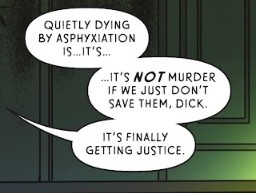
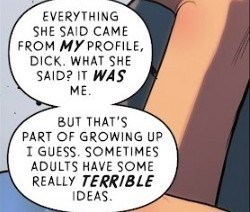
Not only that, but Tim has shown this belief through his thoughts and actions before. Twice.
The first time goes all the way back to Robin 1991 #5. During the fight against King Snake, Tim kicked him through a nearby window, fifty stories above the ground. As King Snake's life hung in the balance, Shiva appeared and commanded Tim to kill him.
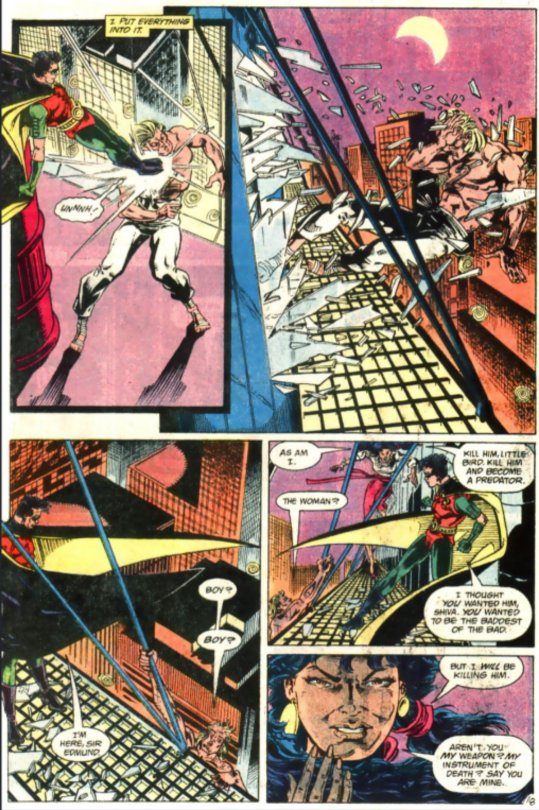
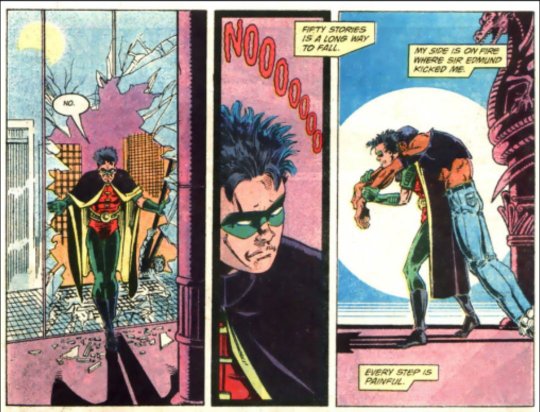
Tim refused. He walked away, leaving King Snake entirely at Shiva's mercy.
What gets me is that Tim made no move to save King Snake from falling. And he made no effort to stop Shiva from committing the murder, either. His only thought as he heard the man's scream was "Fifty stories is a long way to fall."
The second time was in Red Robin 2009 #26. Tim orchestrated a whole plan to manipulate Captain Boomerang into getting killed by Mr. Freeze. The whole time, Tim blamed Captain Boomerang for making all those bad choices, despite Tim being the one raising the chances of them being made. Tim believed he was innocent because he wasn't directly participating.
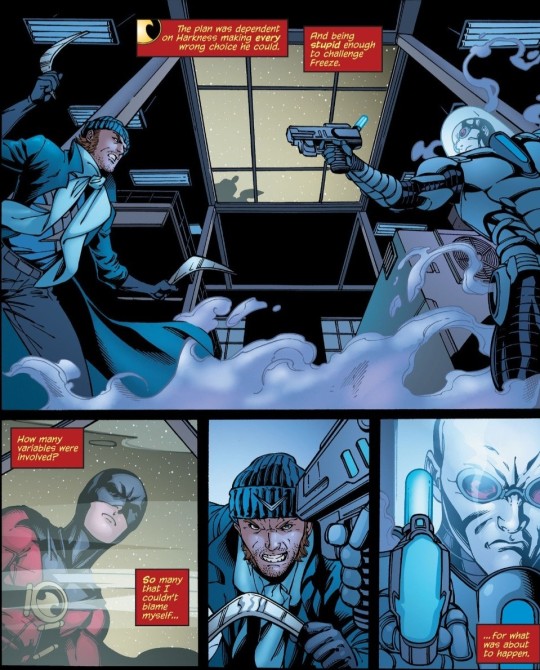
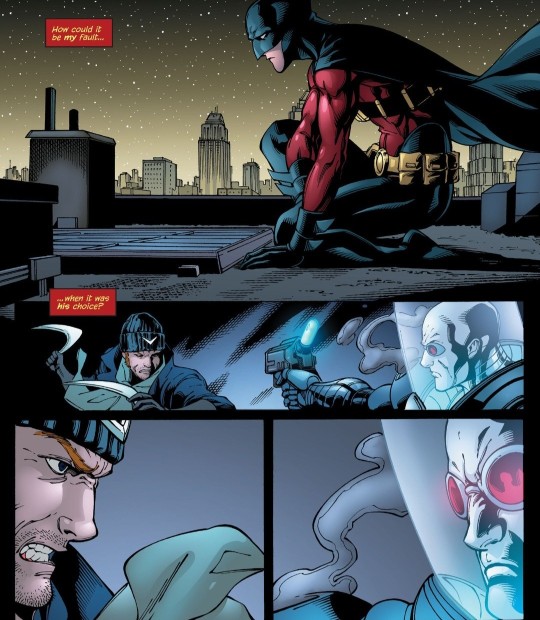
Tim then stopped that plan, but not for any noble reason. He decided that he couldn't let anyone else kill Captain Boomerang but himself.
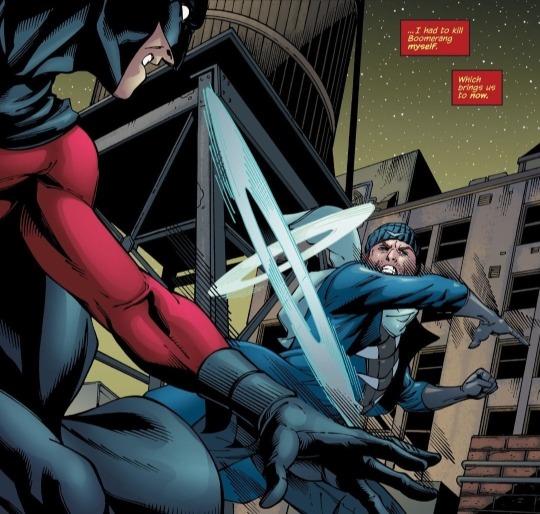
Tim couldn't bring himself to do that, either. So he had to spare his father's killer in the end.
This seems pretty cut and dry so far, right? Tim believing that letting villains die is alright as long he doesn't do the deed himself? I'd think so too, if there weren't other moments contradicting this.
In Robin #35, Steph insisted on leaving an enemy who got buried under the snow to die. Tim chastised her for it.
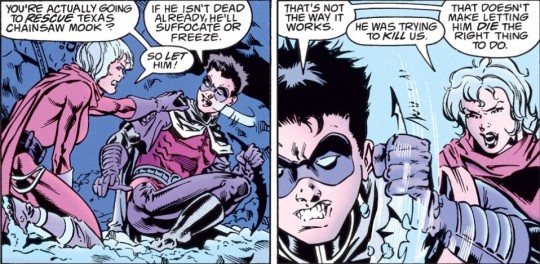
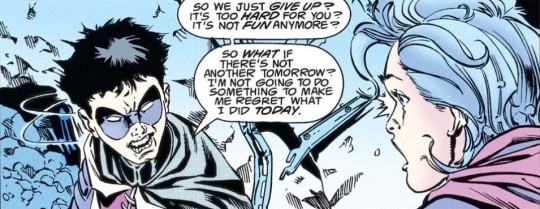
Neither of them were responsible for the snow, or for the enemy getting trapped in it. Plus, that guy tried to kill them with a chainsaw moments prior, so he's not exactly an innocent damsel in distress.
Maybe it was because this enemy wasn't a big enough fish to fry. We didn't really get confirmation that this guy has actually killed before, and he's around goon status at best.
But then in Robin #46, Tim chose to save another enemy who got himself into a deadly situation. That enemy was a murderer known as Young El. This time, Tim wasn't telling anyone else why they should save a murderer's life out loud. These were his private thoughts.
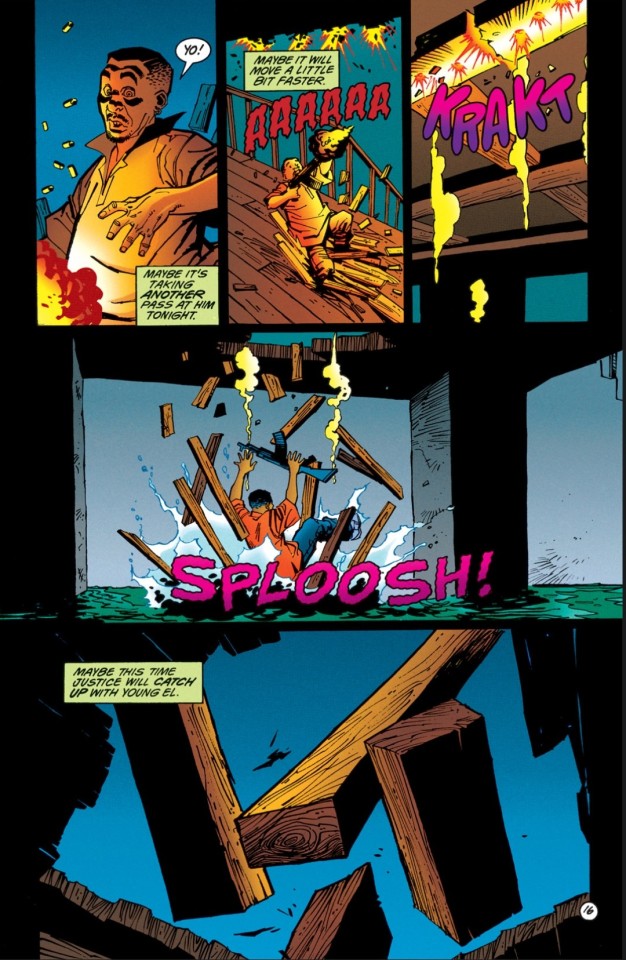
Notice how Tim's inner monologue sounded kind of on-the-fence. He contemplated justice finally catching up with Young El as the floorboards gave way, bringing a support beam down on him in the process.
However, Tim immediately switched gears to rescue Young El from under that beam before the water rose too high.
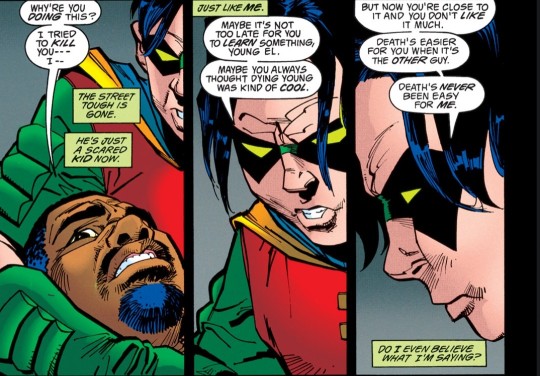
But Tim, as he told Young El the reasons he's saving him, asked himself "Do I even believe what I'm saying?" He could be asking this about two different things he said here. A) "Maybe it's not too late for you to learn something, Young El.", or B) "Death's easier for you when it's the other guy. Death's never been easy for me."
For Tim to doubt his belief in either of these statements is very interesting. He could be questioning if Young El is already too far gone for redemption, or he could be questioning if seeing someone die has never been easy for himself. For all we know, it could be both.
Unfortunately, Tim never got to see if his choice to save him would pay off. Tim wasn't strong enough to lift that beam, and Young El drowned.
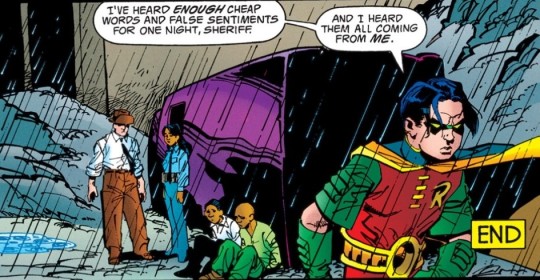
There's a question on my mind as I read these pages. What makes this murderer's death different from when Tim let King Snake fall to his "death"? Sure, King Snake didn't actually die, but Tim didn't know that until later when the man came looking for revenge in Gotham.
Tim was once able to simply walk away from what he was certain would be a killer's demise. But then he's consumed by guilt over not being able to prevent a different killer's death down the line, to the point of hallucinating.

On top of that, what changed Tim's mind later? Red Robin #26 and Robins 2021 #3-6 still happened in the future. The only significant difference I can tell is that these two comics involved the killer's of Tim's parents, making it personal. But if the Imposter from Robins 2021 got his beliefs from his profile before his mother's killer got involved, then does that still hold up?
Maybe we should put a pin on it for now. There are other things Tim's done that brings the details of his no-kill rule into question.
Such as that one time Tim actually killed someone with his bare hands.
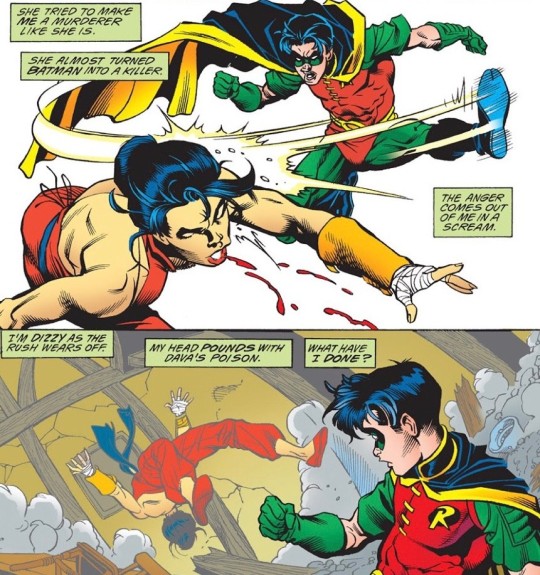
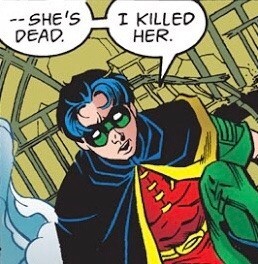
In Robin issues #51-52, Tim accidentally killed Lady Shiva while drugged on amarilla, a plant that enhances the user's speed beyond human limitations.
It may be argued if the amarilla altered Tim's mind enough to excuse him of fault or not. However, I want to focus on what happened after Shiva was revived. Here's another question to go with the first one:
Does Tim believe the kill still counts if the victim was revived afterwards?
From what I've gathered, yes and no. It's kind of complicated.
After Tim killed Shiva, he was understandably distressed about it, about how he can never take it back.
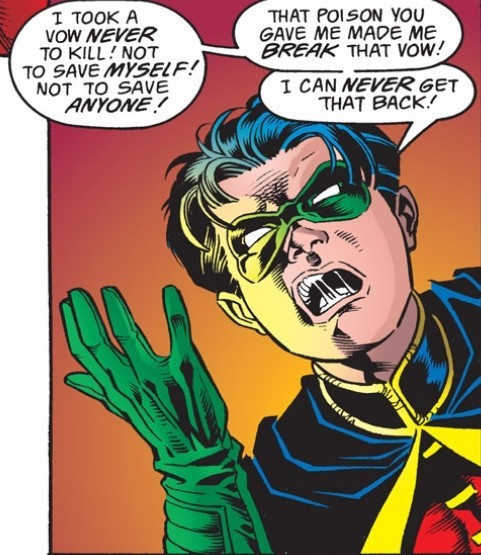
But after Shiva came back to life? Nothing. He didn't dwell on the fact he broke the vow to never kill. For something that devastating to happen in his life, it's odd that Tim didn't bring it up ever again, privately or otherwise. Especially considering what happened later in Robin #123, when Tim thought he killed Johnny Warlock.
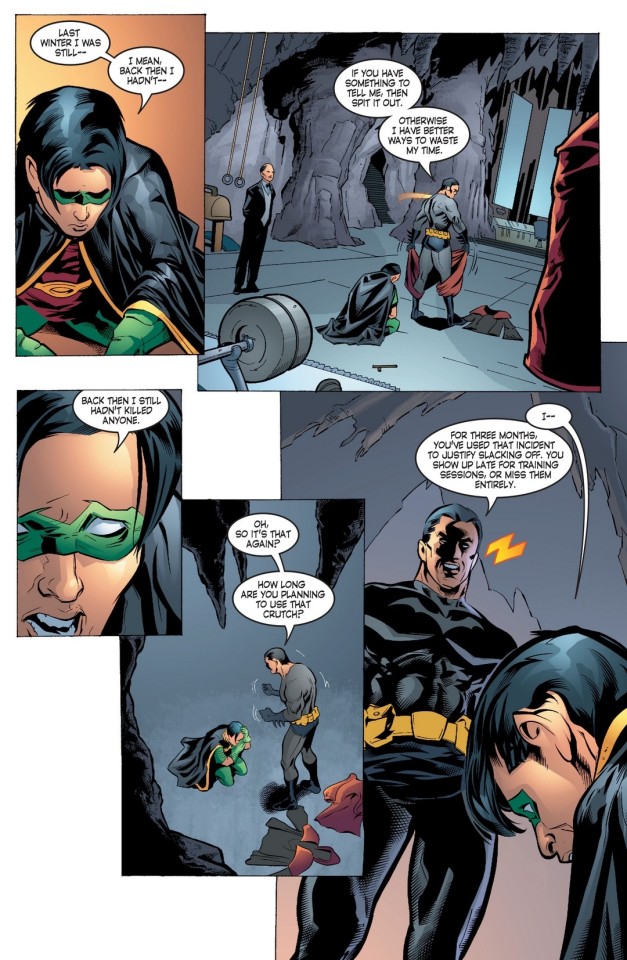
Tim was utterly inconsolable. He lost all faith in his abilities as Robin, and in himself as a whole. It also contributed to his decision to quit being Robin after his dad found out. In general, he seriously dwelled on that "kill" for a much longer time than he had after killing Shiva. The difference being that he knew Shiva was resuscitated immediately afterwards, while Tim didn't know Johnny survived until issue #141.
But there's the fact that Shiva really did die. Her heart and breathing both stopped. So are we to believe Tim moved on from that so easily because she's alive now? What happened to never getting that back?
Come to think of it, not long after Tim killed and revived Shiva, there was someone else who landed in that same boat. Dick.
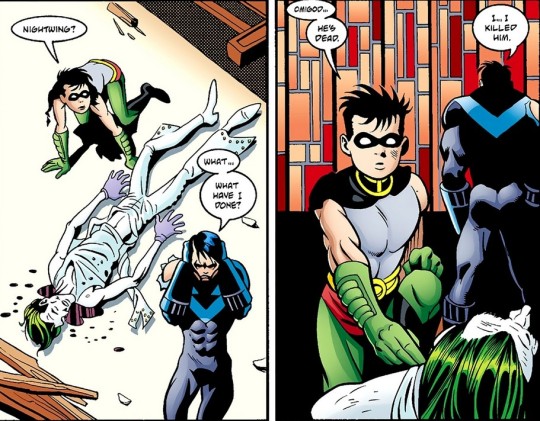
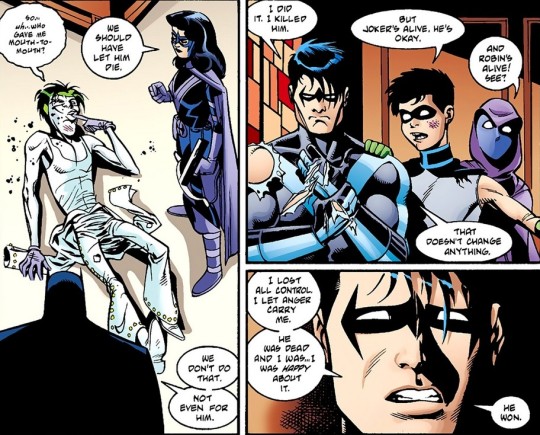
In Joker: The Last Laugh #6, Dick brutally attacked the Joker after believing he killed Tim. Dick ended up accidentally killing Joker instead, before the clown was resuscitated.
Here's the thing. While Tim was trying to comfort Dick, saying that it's ok because Joker's alive now, Dick didn't believe so. He was still distraught that he killed someone. The fact Joker came back to life afterwards didn't matter to him. To Dick, it still counted. So what does that say about Tim?
Before we move on, there's another person Tim knows who also died and came back from the grave. Jason.
Tim openly acknowledged Jason was killed before coming back, too. Multiple times. For example, when they met up in Red Hood and the Outlaws 2011 #8.
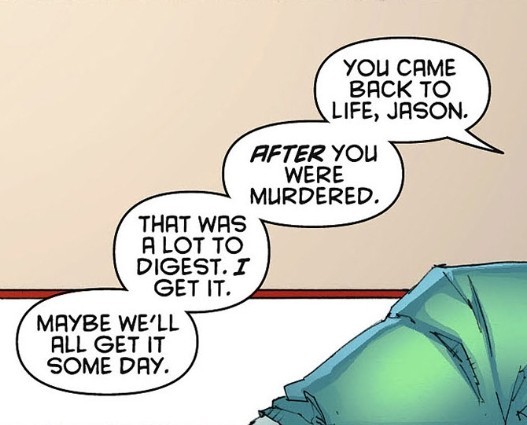
Tim hadn't shown any signs that he thinks Jason's murder doesn't count anywhere, except for maybe once.
In Knight Terrors: Robin #2, Tim and Jason had a heart-to-heart, and Tim said something strange.
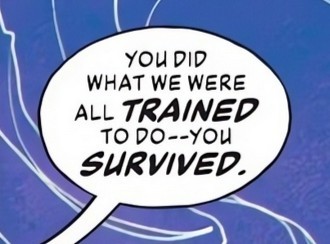
"You survived."
Except Jason didn't survive. He died. To say Jason survived that night would've meant he never died to begin with. Him being alive now doesn't change that. Was this Tim telling a white lie to make Jason feel better? Or does Tim see being revived after death as "surviving"?
Ok, now we can move onto the next question. Or rather, bear with me as we go back to the first question. It's a broad topic with plenty more to talk about.
What does Tim count as breaking the no-kill rule?
We already asked how Tim feels about bringing villains back from the dead after killing them. And we asked how Tim feels about leaving a villain to die without getting directly involved. However, we still don't know how much involvement Tim needs to have in an enemy's death before he'll take responsibility for it.
We can confirm he won't mercy kill in Red Robin #21, even if it means giving someone a fate worse than death. No exceptions.
Tim also doesn't allow anyone he's actively teaming up with to kill, especially if he's the one in command. He's been amicable with known killers before (Huntress and Pru, for example), but only when they remain non-lethal while working alongside him.
Apart from that, though, it becomes less clear. However, I think this is a good place to expand on when Tim blew up a lot of League of Assassins bases in Red Robin #8.
I'm not going into whether or not those explosions actually killed anyone. I've seen evidence supporting both sides of this debate, so I'm just going to say it's up to interpretation. What I AM talking about is whether or not Tim would've felt responsible if they had killed someone.
Before overloading every generator in the LOA database, Tim gave a warning to the Wanderer. He told her that he couldn't be held responsible for what would happen to her if she didn't leave.
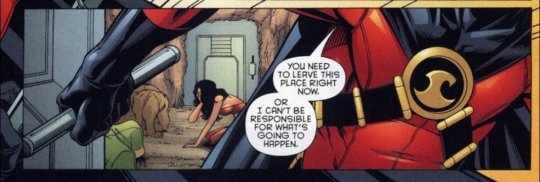
After initiating the explosions, Tim warned the White Ghost that they had fifteen seconds to leave before it was too late.
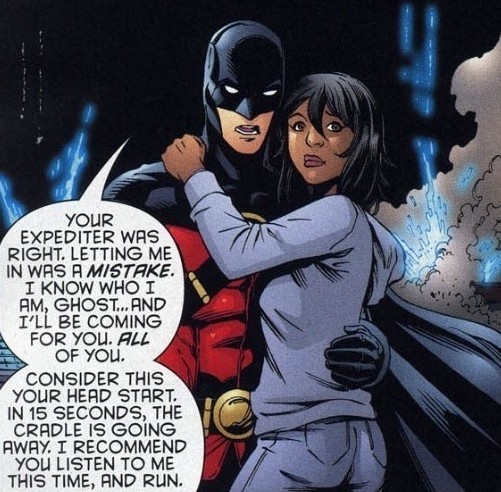
Fifteen seconds. That explanation on the mistake of letting him in might've taken roughly another fifteen to twenty seconds. Did the other bases even get a full minute head start? The way some of the people were already running away could imply they at least got a warning, but it's possible they might not have.
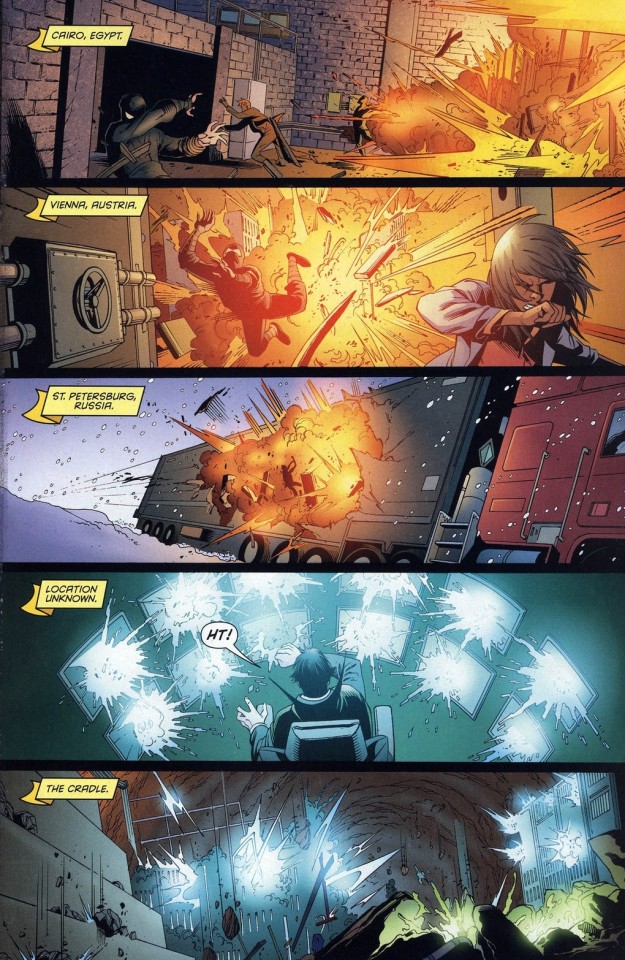
Even if everyone in every base received a warning, would that be enough for Tim to avoid holding himself accountable if they didn't make it out in time? Tim's the one who rigged the bases to explode, but I guess giving someone a warning means it's now their fault for not heeding it?
We can't be sure he even considered the possibility of those explosions killing anyone. Tim knew they were dangerous enough to bring the whole Cradle down, and the other ones we saw looked pretty powerful (except the ones in Ra's hideout). But Tim also called Ra's a murderer right after that happened, which would've been very hypocritical if Tim himself thought he committed murder.
So, my guess is either A) Tim relied on sheer luck for those explosions not causing any casualties and chose to believe they hadn't, or B) Tim didn't believe the deaths of anyone caught in them would be his fault.
Again, this isn't about whether or not blowing up the LOA bases killed anyone. It's about how willing Tim was to take that risk, and if he would've blamed himself for anyone getting killed from it.
Either way, it's canon that Tim had no guilt for the explosions he caused, or for anything he did before Red Robin #22. Just ask the Sword of Sin.
This is an exerpt I got from the Fandom DC Database on the Sword of Sin:
"The Sword of Sin can be ignited with the mind of the wielder, if the person is powerful enough. The sword has the ability to conjure in the mind its victims all of the sins for which they are guilty or have not atoned for."
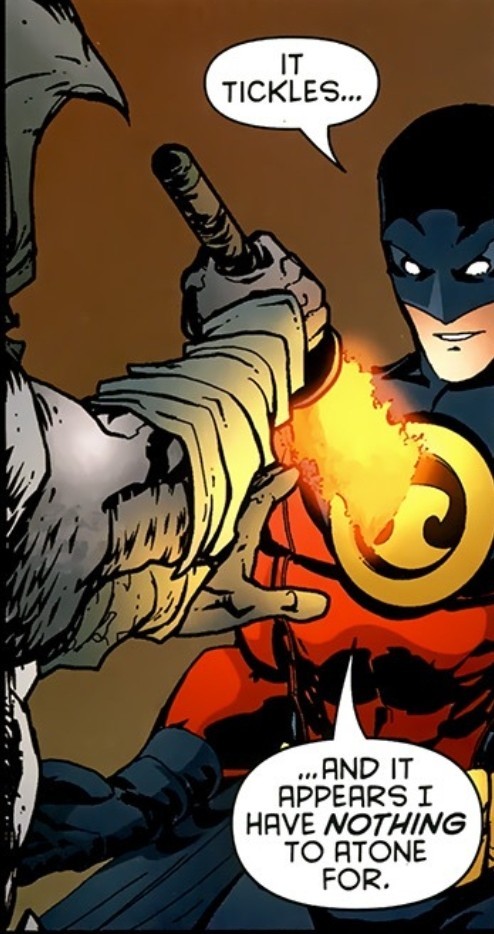
When Tim was stabbed with this sword, he was immune. The Sword of Sin decided he was innocent. Although, I have to ask how reliable this sword was in making that judgement. If the sword is judging others based on its own set principles, then something's not right here.
The Sword of Sin was also used on Dick, and he wasn't immune. It dug into Dicks subconscious and unearthed memories he'd long since repressed. Memories of himself watching a boy get beaten to near death, and then doing nothing. He just walked away.
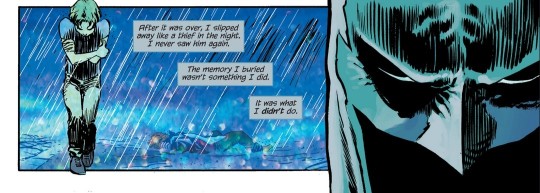
Now, tell me why the sword brought this to light, but not the time Tim left King Snake to die!
It wasn't an accident. Tim deliberately chose to leave instead of trying to save this man from the murderous Lady Shiva. Sure, Tim was no match for Shiva and he might've not been able to stop her, but the same could be said for an eight year old Dick not stopping a group of much older kids. Neither of them tried to stop the attackers.
Tim didn't atone for it, either. When King Snake returned in Batman #469, Bruce told King Snake that it wasn't Tim who left him to die. We know that's a lie, but Tim never corrected this. He let Shiva take all the blame.
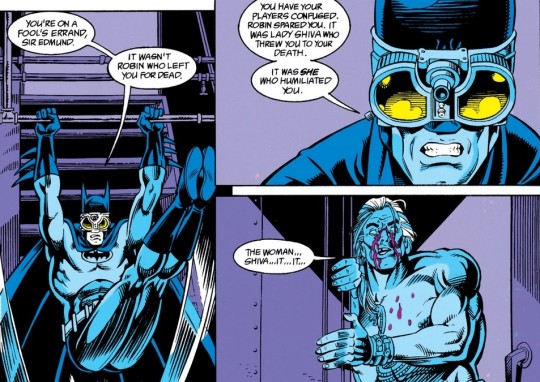
We have two instances of a boy choosing not to prevent someone from having a near death experience. One guilty, and one innocent.
Did the Sword of Sin think Tim was justified because King Snake was corrupt? That doesn't sound holy to me.
Was it because Tim didn't feel any guilt over it, while Dick did? Can the sword's judgement be thrown off by the victim not feeling any shred of guilt over their actions, even subconsciously?
That could make sense given what we know Tim did in the past: King Snake falling, the vandalism (explosions), and ALL the lying over the years (Tim reviving Shiva might count as atonement, so I'm not including that). If the sword based its judgement on God's will alone, then odds are high it would've picked up on one of these.
Even so, I'm not going to sit here and say this is definitely the case. I'm not familiar enough with how the sword effects other characters to make that call.
If this is indeed false, then did the DC universe's version of God decide to pardon Tim of his sins when he prayed earlier that same issue, despite him not believing he had any? I mean, who knows, right?
You can probably see why there's more questions than answers. The point is Tim didn't have any guilt for the things he did before Red Robin #22. Tim was canonically convinced he had nothing to atone for.
So then why did he say the opposite later in Knight Terrors: Robin #2?!
In the heart-to-heart between Tim and Jason, Tim tells him this:
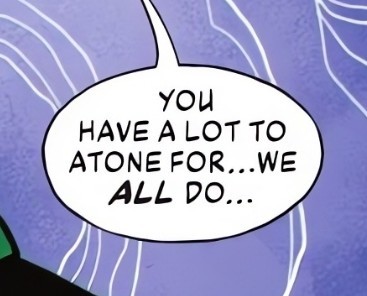
"You have a lot to atone for...We all do..."
Tim knows that the words "we all" include him, right? By saying this, Tim admitted to also having things he needs to atone for, right?
Is this another white lie to make Jason feel better? Is it one of those slight changes the New 52 made to the canon? If not, then why did he change his mind? Did his no-kill rule change and make him feel guilty for some past actions? Is it not the no-kill rule, but something else?
What changed?!
Where does Tim draw the line?
I don't know. We've narrowed it down to a general area, but it's kinda hard to see a line when it's so blurred it could be a gradient.
Tim baffles me. He acts as a steady moral compass for others when he can't even seem to stay consistent with his own. You're free to call it poor writing (and honestly, fair), but I find his hypocrisy fascinating.
That's what it is, isn't it? Tim's a hypocrite who's completely oblivious to being one. And it's not like this was never mentioned in the comics before. Damian called him out on it!
In Batman & Robin 2011 #10, Damian confronted Tim about his near-murderous reaction when Fist Point killed Artemis (Teen Titans Vol 4 annual #1). Damian then accused Tim of constantly rejecting him because they have more in common than Tim's willing to admit.
It's debatable how accurate that accusation was, but Tim had a pretty volatile reaction to it.
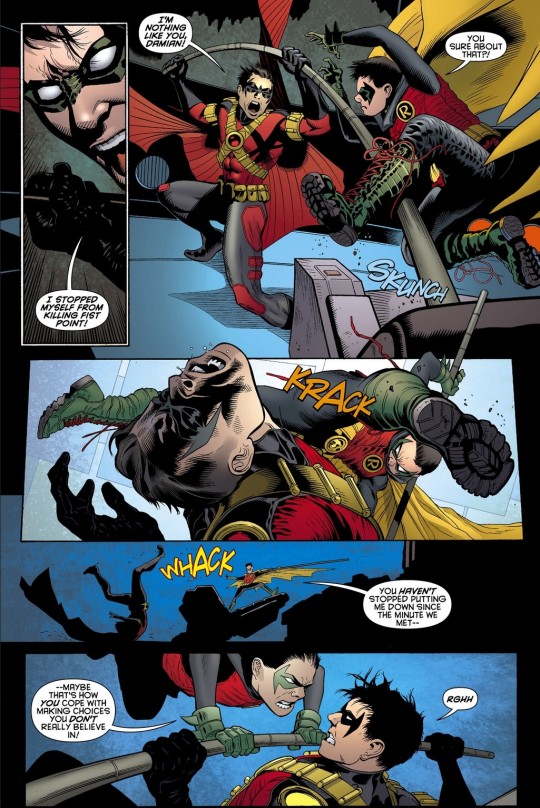
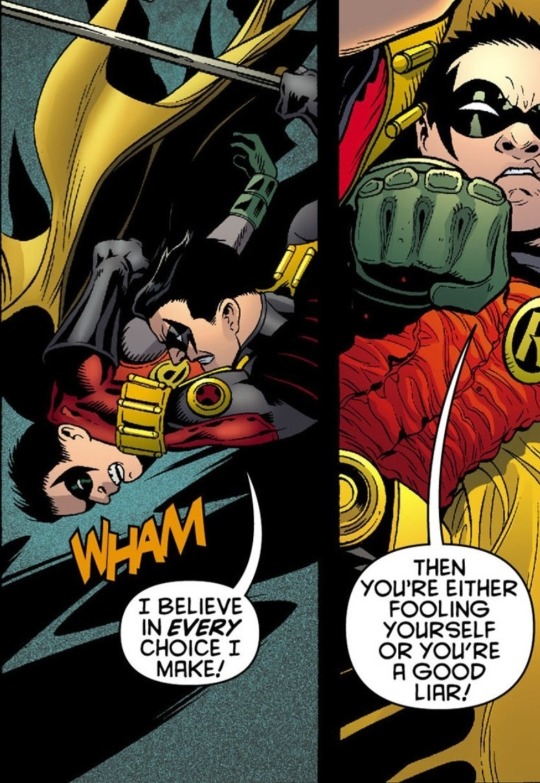
"I believe in every choice I make!"
Does he? I don't think someone who's so sure of what he believes in would contradict himself to this extent. Especially if he wasn't doing it on purpose.
He wouldn't vehemently push Bruce's no-kill rule onto others and berate them for bending that rule, only to go and bend that same rule himself when the Batclan isn't around. He also wouldn't exploit what he thinks are loopholes, decide later that those loopholes broke the no-kill rule, and then earnestly claim he never broke it.
Why is he like this?! He's had arguably the most normal childhood out of the whole Batclan before becoming Robin! What could've made him so fickle about this?!
Where does he draw the line? And how will he know when he's crossed it?
#batman#dc#robin#tim drake#red robin#theory#analysis#long post#tim drake is a menace#unhinged tim drake#To think all of this was written without mentioning Tim's corrupt future selves#or the numerous times he's actually contemplated or attempted murder#Believe me I would've loved to add 5-10 more screenshots of those moments alone#but I hit the 30 image limit :(#Anyway I want to study Tim in a lab#Feedback is welcome#I'm aware I hadn't read all the DC comics so I could've missed something
804 notes
·
View notes
Text
sua: the most honest deed is to sacrifice yourself (because that is the greatest display of love and how to keep it safe).
ivan: the most honest deed is to die (because no one cares, because living is ingenuous, a lie for the sake of getting by for a reason you don't even know, because living was never truthful).
luka: the most honest deed is to kill what's in the way (because that is the only way to attain love and attention and to keep it, the rawest performance of one's life).
hyuna: the most honest deed is to keep living (because it is what humanity does best, because this is how the future survives).
till: the most honest deed is to love (because love is creation, because love defines living, to touch everything and to mark the world by merely existing for the sake of existing).
mizi: the most honest deed is to know (because being deceived is pain, because the firsthand torture of discovery too late rather than sooner is the force of lies and only lies, what kind of life is lived in the dark when only the light nourishes, even the source of the glow itself must be replenished and fueled by some sort of shadow).
#alien stage#alienstage#alnst#character study#alien stage mizi#alnst mizi#alien stage hyuna#alnst hyuna#alien stage till#alnst till#alien stage luka#alnst luka#alien stage sua#alnst sua#alien stage ivan#alnst ivan#love#analysis#prose#writing
329 notes
·
View notes
Text
new mizi comic is an insight to her character. she isn’t manipulative nor is she evil. she just believes for her to be able to live, she needs to be loved by others.
“I want to live a little longer. So please keep loving me.”
The tragedy of Alien Stage isn’t the deaths, slavery, or the apocalypse. It is the fact that even though humans were raised completely different from how they should have been, at the end of the day, they all wanted to live. They wanted to love because they wanted to live.
In their minds the reactions we deem to certain emotions are connected to other things. Crying is a humane response to sadness, it can be seen as unsightly but here her crying because of her pain is seen as “adorable”.
“I just felt like I’d be at peace being in a place where I’m not the one being crushed but a place where I could crush someone.”
“Crush” in Mizi’s definition means protecting but also suffocating. Her “provider” got crushed in front of her, most likely whilst trying to protect her or by the Segyeins.
Her finding Sua “adorable” is directly linked to how her owner found her “adorable” while she was being “crushed”. She associates certain emotions with certain experiences, which are inherently different experiences from what a normal human would associate it with.
It is so important to remember that the Alien Stage characters are slaves, that they are in a different planet after Earth got razed and invaded by aliens. Their societal rules and responses are fundamentally different from ours. I believe trying to analyze their pasts and psychologies with customary, run-of-the-mill thoughts is doing them injustice.
312 notes
·
View notes
Text
the most important thing when i write dipper and mabel is to understand that they are not stan and ford.
that's not to say that there aren't similarities. obviously, the twins have dynamics that can be compared to each other in a myriad of ways, both separately and together.
but it's so very vital that dipper is NOT a 1:1 ford. and mabel is NOT a 1:1 stan.
dipper has ford's love of rationality and mysteries, but he has stan's love of stories and family. mabel has stan's pure chaos, but ford's pre-bill trust in people.
dipper and stan both approach the world with cynicism. young ford and mabel approach the world with wonder.
stan was the twin worried about being left behind, just like mabel. ford and dipper both wanted to carve a path for themselves and their future.
mabel was so scared of losing her brother that she accidentally caused weirdmaggedon, just like stan was worried about losing ford that he accidentally sabatoged ford's science project/collegiate future. but dipper was the one who fought like hell mostly by himself in the apocalypse for three days to get her back, just like stan worked for thirty years to save ford. there is nothing dipper wouldn't sacrifice for mabel.
in my humble opinion, this is why the pines family dynamic is so damn compelling. they aren't carbon copies because that's not how people work. there is a sincerity, an honesty, a relatability between all of these characters and their flaws.
mabel and dipper aren't just the younger version of their grunkles. they are a crazy mishmash of the best and worst traits swapped around and punted to the moon and back.
exploring each micro-dynamic is so fascinating. i love this weird little family.
#gravity falls#character study#dipper pines#mabel pines#stan pines#grunkle stan#ford pines#grunkle ford#my writing#analysis#character analysis
627 notes
·
View notes
Text
Currently thinking about how the death of Polites fractured the dynamic of the crew which led to quite literally the rest of the Odyssey in EPIC the musical. The entire crew relied on this man and NO, I am not exaggerating.
Polites served as the temperance of Ody; the diplomatic and optimistic council who was a liaison between the captain and his crew. Why? Well, Polites is never acknowledged to hold any power in the crew (we're talking EPIC canon here) but is clearly respected and valued by the captain. This combination is familiar; the crew is comfortable approaching Polites because he's their equal and Polites is comfortable approaching Odysseus with their problems because they're friends. That is his role.
Now I have my own issues with Eurylochus but I do think he's written well. And I also do not think he is fully in the wrong. HOT TAKE I KNOW, but hear me out: Eury was Ody's right hand. Odysseus is clever but he's also pretty humble (excluding the whole "I am the infamous Odysseus" but Bro had a right to crash out there). Odysseus does not surround himself with "yes-men", he surrounds himself with friends who are willing to challenge him. Case and point; Eurylochus and Polites.
Polites challenges his morals and instincts - Polites is always trying to ensure that Odysseus is doing what is best for himself. "You can relax my friend" is not something you tell your leader to do casually. It's what you tell your friend to do when they're working themselves too damn hard. "Greet the world with open arms" is not what you tell your commanding officer who you're trusting to get you home.
Eurylochus challenges his decisions. Always does, in every scene and NO that is not a flaw. He serves as a point of resistance so that Odysseus is forced to consider every option carefully. He makes sure Ody has considered the worst-case scenario and is fully prepared to back him up when that happens. Bro was ready to burn the Lotus island down if his friends didn't come back. Eury is the guy who's willing to strike first and make the difficult decisions, much like Ody is. He is a good second in command.
The point is: the two filled massively different roles in the crew. Eury is supposed to challenge Odysseus and question his decisions - that is his job; to make sure that his captain is making the best decisions for the crew. Polites is supposed to support Ody; he is a friend, a confident, and a source of trust and camaraderie.
What makes them such a well-oiled machine is that they all have specific roles and they are good at them. Ody makes the plans and decides what battles to fight, Eurylochus takes initiative and counterbalances Polites optimism, Polites offers ethical and moral support while counterbalancing Eury's cynicism. That is why the crew works so well.
Odysseus has someone to rely on and someone to challenge him. The crew has someone to confide in and a second in command to consider their needs. They have a captain who listens to both. Eurylochus and Polites have each other to balance out and a captain who values their opinions.
It works. It's balanced. It's a powerful type of leadership.
Then Polites dies, and so does that balance.
Eurylochus finds himself having to fill two roles. He has to question his captain and calm the crew. He has to place complete trust in Odysseus as Polites did, but he can't. His and Ody's relationship has always been based on challenging one another to ensure that they're considering every angle. He has spent his entire life being critical of Odysseus' plans because he knows that's what he's supposed to do. He doesn't have blind faith, he's a realist - optimism and trust were Polites forte.
Odysseus finds himself without that support and line of connection to Polites. He grows disconnected from the crew because of it and flounders when it comes to dealing with Eurylochus.
This is seen clearly in the song: Luck Runs Out
Eury was not in the wrong for pointing out how fucking crazy it is to casually ask the Wind God for some help. Sure let's go knock on a god's door and ask for loose change; HELLO!? There are so many ways it could've gone wrong and it has always been Eury's job to point such flaws out. It's what he's always done - probably what he's done for Ody throughout the war.
But Odysseus? He just lost his best friend and his mentor. His entire support system is crumbling, so being challenged by the one person who he needs to have his back pushes him into a dangerous space as a leader.
On the one hand, he cannot afford to have Eury question his every move, especially since Polites isn't there to challenge him for Odysseus. Especially now that he doesn't have Polites instilling trust in the crew - he can't afford Eury's challenges to eroding what trust remains in his disheartened crew.
On the other, pushing Eurylochus away and demanding staunch obedience from him is so out of character for their relationship that all trust between Captain and SOC is suddenly up in the air.
That is why Eurylochus opens the windbag. Not because he wanted "treasure", but because the captain who demanded he "be devout" is not the captain he's followed all this time. The captain who sits awake for four days, eyes following every crewmember with a glimmer of distrust is not the Odysseus Eurylochus knows.
Eury knows Odysseus with Polites. If Polites had been alive, he would've been able to quell the crew's distrust because he would have had full trust in their captain. Odysseus would've been able to trust his crew because he could trust Polites. He cannot trust Eurylochus to have that same blind faith, because Eury doesn't have it; and the crew knows it.
Everything's changed since Polites
It's not a throwaway line; it's what the crew whispers to Eurylochus. He's different. He's changed. Odysseus is not the same. Maybe it is treasure. Maybe he's lying to us. How do we know? How do you know?
And Eurylochus doesn't know. He isn't certain. Odysseus is his friend and his captain; that's a difficult power dynamic to balance.
So Eury opens the windbag, because he doesn't trust Odysseus. It's a different sort of mistrust though - not one of constructive criticism from a friend, but earnest dangerous mistrust of your superior.
Eurylochus leads the mutiny, because that was always his role as Ody's right hand; to question and stand against what he felt was wrong. To speak for the crew as another leader.
But Eurylochus never wanted to be captain. He never wanted to betray his friend. He felt he had to - Yes, he was willing to leave crewmates behind in Circe's lair because he has always been willing to make those hard calls.
Odysseus? He so rarely does what Eurylochus wants to do because they are not the same person. Eury doesn't want Ody to be him (Eury has flaws, but ambition is not one of them. He recognizes he isn't a good leader hence he immediately falls back on Ody's judgment after the holy cow bit) - he wants Ody to listen to him and consider his insights. So for Odysseus to sacrifice six of their crewmates without a word to his friend - without consulting anyone - without leaving space for his right-hand man to question him... that is when Eurylochus loses faith in Odysseus. Because that is not his captain. He doesn't know who it is. But his captain would never.
Hypocritical? Yes. But also rather insightful.
And Odysseus? He loses the last pillar of support he has in the crew, not because Eurylochus changes - not even because he changes. He loses it all because it is doomed to fall apart without Polites. It was all doomed to fall apart when they lost their counterbalance.
It is not Ody's mercy or ruthlessness that kills them. It is not Eury's distrust. Both of those existed far before it all went to shit. It was Polites dying. It was the fact that the three of them were so well suited for leadership as long as it was the three of them.
It had to be the three of them.
#epic the musical#epic#odysseus#the odyssey#eurylochus#polites#epic odysseus#epic eurylochus#epic polites#luck runs out#open arms#mutiny#odysseus crew#character study#character analysis#character dynamics#Their trio dynamic was actually such a great foundation for good leadership#But it was so delicate because they relied on each other so heavily#without even realizing it#Woooo sorry another essay on this musical but I felt this was necissary
293 notes
·
View notes
Note
Why do female protagonists complain about their looks? I was reading a novel a friend recommended and within the first few pages the narrator is complaining that her eyes are the color of mud, her hair is boring and brown, she has freckles, etc. Is this supposed to make them relatable? I don't particularly like my freckles but it's not something I think about more than once or twice a year. It's just annoying and a downer when the character does this.
It's because girls in books (... and girls in real life...) are supposed to walk this tightrope where of course they are beautiful (because beauty = value.) But they can't seem like they're trying to look beautiful (because trying to be beautiful = vanity, shallowness, a kind of girly femininity that's either childish, pathetic, or sinister.) The Stepsisters are trying to be beautiful. Cinderella just is beautiful. Dress her in a potato sack and roll her around in mud, she'd still be more beautiful.
This is where the "protagonist who doesn't think they're beautiful" thing comes from. Obviously if they don't think they're beautiful, then they're not trying to be beautiful, with all the negative junk surrounding that. So you get these annoying descriptions where a regular or even cute-sounding person will say "ugh, I have eyes the color of mud and hate my freckles," not "I have brown eyes and freckles." (Bet you five dollars the love interest thinks her freckles are adorable, and gets lost in her deep, dark doe eyes.) Also - "mud colored eyes" is such a strange thing to think about yourself? If the author wanted to commit to writing about someone who actually had body image issues - then the internal narrative would be my skin sucks and I'm too fat. But that's a little too real: the reader can't actually think the protagonist is unattractive.
Which is too bad, when you have a female protagonist who is just isn't very attractive, that can be fantastic. In Jane Eyre, it's important that Jane is sort of unfortunate looking - it effects how people treat her, the sort of jobs she can get, but it also lets her fly under the radar and be invisible in way that would be impossible if she were more beautiful.
I tend to prefer descriptions that stress - how people move, or what they're wearing, because that reveals character in a way that "brown hair" just doesn't. I want to hear about a character's attractiveness if they are so remarkably attractive (or unattractive) that it affects how other people treat/perceive them. Same way someone might treat a character differently if they had a dramatic scar, or looked a lot younger than they actually were, or were a different ethnicity from the rest of the cast. Just give me a handful of their most distinguishing characteristics, and you don't have to do it on the first page.
456 notes
·
View notes
Text
hades threatening zagreus with the premise of punishing him if anything happens to Persephone makes me want to puke. I don't really remember the dialogue entirely, but I do remember that he mentions something along the lines of: "it doesn't matter if you are my son"
his love for Persephone blinds him from everything, and while it "sounds" romantic, it's absolutely horrible. he didn't take responsibility of anything happening around him that wasn't his duty. I don't blame him for his neverending load of work, no. And I don't blame him from being overwhelmed, tired, sad, angry.
But he never took responsibility for his actions regardless anything else. he appointed Nyx to care for his son, because he doesn't know how in the world he could take care of a young child, and she has experience, but at the same time, instills what he believes to be wisdom and experience.
he has heavily neglected zagreus over the years, never addressing him truly, maybe because saying his name hurts (given that it was chosen by his wife), berating him, or ignoring him altogether. he appointed people to teach him, and then realized that said people, who his child loves more than anything, care about him as well. and that love, he cannot crush, and it's bigger than any other threat he can make.
The worst part is that throughout the journey, he doesn't understand or care to think about why people love Zagreus. To him, he is a petulant, over confident, irresponsible, entitled child that doesn't know true suffering.
His yearning blinds him from the house that is there. He stops Zagreus because he wants to protect Persephone. And because he believes that Zagreus will harm her. That his very presence is a poisonous thing.
This post is not meant to exonerate Zagreus of his own flaws, no. But it is meant to concentrate how frustrating it is to watch a child do so much for his father, just to be acknowledged by his name when his wife says so. Zagreus has no fucking door for fucks sake. NO FUCKING DOOR.
He is isolated and at the same time, exposed to everything. Called useless, disgusting for having red blood. Unwanted by his father. Who starts to change because she is there. Not because of anything else.
He is doing it for her. And for the daughter that's yet to come.
Not for him. Never for him.
Always an angel. Never a god.
239 notes
·
View notes
Text
Despite what Damon Maitsu wants to think, he has been incredibly trusting and kind throughout the Killing Game thus far. His actions contradict a lot of his own inner thoughts. Even though he is often rude he’s also rather kind, and that’s important to recognize since he wants to believe he’s so de-attached from everyone.
I think the first thing that comes to mind is the first trial’s Pathos route, where Damon decides to defend Diana based on his gut feeling despite all the clear evidence- or, trusting Diana’s character to be true over his own deductions. The second thing is when he realizes his trust of Eva is built on nothing. What both of these things have in common is how mad Damon is about it. Damon doesn’t want to defend Diana, he gets incredibly mad at himself when he realizes he’s sympathetic to her crying and wants to trust in her. The same goes for Eva, but his trust is lost instead. Damon gets angry when he realizes the only reason he trusted Eva was because he fell into the “Us vs Them” mentality, and he automatically grouped Eva in with himself, but Eva didn’t do the same thing. At the core of the issue, Damon is mad because without even realizing it, he is a hypocrite. He claims the students shouldn’t be able to so easily trust each other, then went and easily trusted just the same- and chose the worst person to acknowledge he trusted.
I say Damon acknowledges he trusted Eva because I think Damon trusts the other students more than he realizes. He is easily able to engage in Free Time Events with every student, except Grace. The fact there’s no Grace FTE’s, or to be Meta an exception to “hang out with your favourites!” rule, makes it feel in-character that Damon trusts the other students enough with his safety, but not Grace. Also, a lot of what happens in those FTE’s like Jean picking up Damon by his ankles has to mean they’re at least some sort of comfort with each other. The other students do seem comfortable with Damon, even the youngest student Toshiko knows she can call Damon a cutesy name like Mochi- he’s unhappy about it but ultimately does nothing. Ingrid asks him to help with the laundry and he agrees- grumbles about it later to himself but doesn’t actually protest to Ingrid’s face, and does his share. There’s also the fact that Damon doesn’t protest the roommate rule, and then how immediately comfortable he gets with said roommate. He even prefers to sleep in Kai’s room at a certain point, as sleeping alone in his own room makes him too anxious as opposed to sleeping along with someone else. For someone who claims to be untrusting, Damon spends a lot of time with other people one-on-one and in group settings, and being kind to them as well.
The only time I can think Damon doesn’t cooperate with the group is when Eva shows him the Tozu Equation and he says they should keep it secret. However, even then, Damon means *he and Eva* should keep it secret. He still means to work with Eva, as their own private team. He doesn’t go work on it on his own at any point, and asks her about it later if she had made any progress. When she says no, Damon assures her that he hadn’t expected her to with all the ongoing issues. He believes her at face value and doesn’t go to check on it, and was kind to her about the issue.
Still, there is an obvious elephant in the room: Damon is still an outsider. He’s not part of the group, there’s no equal exchange of first. The obvious solution, and one Damon comments on himself multiple times, is that he’s cooperating with them only to gain their trust, *not* because he trusts them. However, I think Damon is lying to himself, or is just unaware of how much trust he puts into his actions. For a comparison, I want us to look at Eva. Eva only spends time individually with Damon, who she “trusts”. Other than that, the only time we see her with others is to gather information or purposefully be seen while plotting her murder. We don’t have much insight on her rooming situation but Diana’s comments imply Eva was often absent from their room. Eva tends to lurk in the boiler room alone, specifically because nobody wants to go down there. She has no interest in her classmates and doesn’t trust any of them, and only takes interest in them when she needs them. Now this could just be a difference of strategy (Eva wanting to gain trust when the time was right, and Damon wanting to gain trust in advance) but frankly, it didn’t work. Damon spent more time cooperating with the class, and yet in the trial they hesitate to believe him over Eva based on his character. The only reason they choose to believe him is because they take a moment to reassess everything Damon has been saying, and draw a logical conclusion. Damon has still gained no real trust from their group, so what was the point of everything he’s done if it amounted to nothing?
Damon, whose situation is extremely close to Eva’s, is willing to share his living space with another person, to the point he shares the bed with them (his idea btw), not even swapping the bed every night. Eva feels more safe alone with her own mind and intelligence, but Damon has always reached out to other people for security. After Tozu threatened him, Damon went to Kai despite his belief Kai might kill him. When Wolfgang turned the group against him, Damon automatically latched onto the one other outcast, Eva without even realizing it. He’d already latched onto her from the moment they awoke in the boiler room together.
I definitely missed some stuff, like how Damon was the only one willing to grab Kai’s ring in the FTE- just say no if you don’t want to do it Damon. It’s going to be important to remember how kind he is in these earlier chapters since that kindness and trust he employed has now been thrown back in his own face and spit on (thanks Eva), so I’m not sure we’re ever going to see Damon be this unintentionally kind again.
#sorry this is long I had a migraine lol#damon maitsu#character analysis#eva tsunaka#sorry you watched the one person you trusted die you get five big booms#boom boom boom boom boom#diana venicia#wolfgang akire#project eden's garden#p:eg#project edens garden#p:eg chapter 1#project eden’s garden ch1#project: eden's garden#pjeg#kai monteago#p:eg tozu#Damon was the hypocrite all along#maybe the real hypocrite was the friends we made along the way#Wolfgang and Damon both being hypocrites… oh yeah#kaimon#anaylsis#eve’s ramblings#character study#toshiko kayura#grace madison#jean delamer#project eden’s garden free time events
639 notes
·
View notes
Note
hello! I love your blog. you helped me so much with writing. if you don't mind can you do writing notes on character study. I wanted for so long to do it but I'm lost. thanks for everything
Writing Notes: Character Study
Character Study - a deep dive into a character’s traits, personality, and development in literature, TV, and film.
GUIDE #1. The model below provides a guide for the analysis of the characters in order to identify the personality of each of them, their attitude and the network of relationships holding together the drama/story. The analysis will focus on:
the character’s physical appearance (description of body and face, clothes and accessories);
story of his/her life (identification of all biographical elements that define the character’s story and situate him or her in relation with the others);
point of view (interpretation of the character’s perspective in relation to the overall vision of world as proposed by the author);
personality (description of the character’s behavior defining his/her personality on stage as it relates to others: tone of the voice, gestures, movements, distance or proximity to other characters);
description of the mask (different ways in which each character places himself/herself in relation to others);
definition of the mask’s motivation and choice through which the character will achieve his/her goals.

GUIDE #2. Identify each character on the 4 basic levels of characterization from information you find in the text. The following is a list of suggestions for each category. This is by no means an all-inclusive list, but meant to be used as a guideline:
A. Physical/Biological. gender, age, size, coloration and general appearance
Age – be as specific as possible
Gender/Sex – not only male/female, but virile, macho, feminine, etc.
Health – from excellent to sickly, including how one’s health may or may not effect his/her appearance.
Particular physical characteristics that makes the character distinctive – big nose, hunchback, large breasts, etc.
Ethnic origin – race, coloring of skin and hair
Physical Stature/Figure – perfect, average, tall/short, thin/fat, malformed, hunched, slouchy, willowy, etc.
Physical Activity - dynamic, active, sedentary, listless, etc.
Face – handsome, good looks, common, homely, etc.
B. Social. economic status, profession or trade, religion, family relationships
Class Situation – aristocracy, upper, upper middle, middle, lower middle, lower, beggar etc.
Economic Situation – rich, independent, salaried, day labor, dependent (just because someone is a member of the aristocracy, doesn’t mean they have money)
Social Situation/Social Role - how is the character related to the other characters in the play? Family? Friends? Co-workers? The boss? The King? Etc. Is there a specific social event taking place, such as a wedding, where in the character has to take on a particular social role, such as father-of-the-bride?
Relationship to the World around him/her – How does the character fit into his/her social situation? Is the character popular? Does he/she have friends? Is he/she a loner? Etc. How does the character interact with the other characters - is the character: a leader, a helper, a follower, submissive, a slave?
Occupation – list the character’s specific job or trade
Group Affiliation – Does the character belong to or identify with a specific group or team? (example – a minority group, a club, a sports team, a political group, etc)
Is there a specific social event taking place, such as a protest rally, where in the character identifies with a particular group, such as feminists?
Political affiliation – Republican, Democrat, etc.
Religious affiliation – Christian, Jewish, Muslim, etc.
C. Psychological/Emotional Reveals habitual responses, desires, motivations, like and dislikes – the inner workings of the mind. Reveals how the characters think (psychological) and what they feel (emotional). This is considered the most essential level of characterization. Keep in mind that a person’s thoughts and feelings can often be determined as a further extension of his/her physical and social characteristics. For example – under social, you can determine a character’s religious affiliation. Under psychological/emotional, you can determine what that person thinks or feels about his/her religion.
Psychological State – what does the character think about his/herself and the world around them? Is the character: open-minded objective, subjective, unselfish, selfish, paranoid?
Emotional State – what does the character feel about his/herself and the world around them? Does the character feel: accepted, rejected, oppressed, etc?
Emotional Depth - are the character’s relationships: life-long, lasting, moderate, passing, momentary?
Emotional Control – no temper, slow temper, even tempered, quick tempered, a loose cannon
Emotional Type – extrovert, ambivert, introvert...
Desires or goals – what does the character want?
Loves – what, or who, does the character value?
Weaknesses – what, if anything, is a potential psychological or emotional weakness, on the part of the character, that can interfere with the character obtaining his/her desire?
Prejudices – what, if anything, does the character feel prejudicial about?
Fixed Attitudes – Similar to a prejudice, but not with the negative connotation. For example, in your social analysis you’ve determined the character is Jewish. Now, determine how that character feels or thinks about Judaism – is the character: a zealot, a liberal, orthodox, conventional, a skeptic?
D. Moral/Ethical Reveals what the characters are willing to do (moral beliefs) to get what they want and what characters actually do (ethical behavior) when faced with making a difficult choice. Determine the characters’ moral beliefs and ethical behavior, and how those relate to the world of the play. Be very careful not to judge them based upon your own morals and ethics. For example, you may believe it is morally wrong for two people to live together unless they are married. However, in the world of this play/literature, no characters may hold this moral belief, and the playwright/writer may not be making a point about this moral belief, and therefore such actions are not to be seen as immoral or unethical within the context of the work.
Moral beliefs – an individual’s or society’s beliefs in what is right and wrong in terms of behavior.
Is the character able to determine right from wrong and to make decisions based upon that knowledge?
Determine the individual character’s morals, based on what his/her conscience suggests is right and wrong, rather than on what the law or society dictates.
Determine the morals of the world of the play in general: the principles of right and wrong judged by the standards of the average person or society at large, and how those principles govern standards of general and/or sexual behavior. Does the character hold beliefs in contradiction to those of their society?
Does the character evolve/change? For example, is there a moral belief the character holds at the beginning of the play that he no longer holds at the end of the play? In other words, does something happen for the character to change his mind and be convinced otherwise?
In the work itself, is there a “moral to the story”? Is the writer using the character as a positive or negative example in relation to this moral?
Ethical behavior – how an individual or society conducts themselves according to their morals.
How does a character’s moral beliefs affect his/her conduct? For example, is a character unable to act due to a moral/ethical dilemma?
How does a character’s goals affect his/her conduct? Is the character’s ethical behavior contrary to his/her moral beliefs? For example, a character believes it is morally wrong to commit murder, but to obtain his goal, his is willing to behave unethically and kill.
Does the character believe that he is acting ethically, yet is the writer holding him up as an example of how one should not behave?
Does the character behave according to or contrary to any of the 4 basic levels, therefore giving a false perception of themselves to the other characters? For example, you may have determined that a character is seriously ill, yet the character behaves as if he were in perfect health. Or a character may masquerade as someone he is not. What morals and/or goals are affecting this behavior?
E. Mental/Intellectual A 5th area you can consider. Reveals how intelligent and creative a character may be.
IQ – brilliant, good mind, average, dull...
Education – scholar, college, self-made, schooled...
Mental type – philosophic, scientific, mechanical, artistic, social, scientific...
Dexterity – dexterous, skilled, handy, clumsy, uncoordinated...
Creativity – genius, talented, original, unoriginal...
Interests, skills, accomplishments
QUESTIONS
Who is the Protagonist? Who is the Antagonist?
Which characters are of Primary Focus?
Which characters are of Secondary Focus?
Which characters qualify as ‘set dressing’?
Are any of the characters Symbols or Metaphors?
Are any of the characters Formalized Conventions?
CHARACTER ANALYSIS. A character analysis is a close examination and evaluation of one character from a work of fiction such as a novel, short story, or play.
The only direct description of most characters in fiction is of their physical appearance and/or their professions.
Their identities and traits are established through their interactions with other characters as well as their opinions, reactions, and moods.
For instance, while introducing Katniss (from The Hunger Games), the author did not bluntly state that she is courageous. Rather, this was demonstrated through several scenes in the book, such as when she volunteered to take her sister’s place at the Reaping.
In a character analysis, the writer’s job is to pick up on such hints and subtle clues in the story to reveal a clear image of the subject character. The writer can also evaluate the character, critiquing their development and the role they played in the plot.
Developing a Character Analysis. In order to write a character analysis, the first task is to choose the subject, if not already determined in the assignment question. It is easier to pick if the writer is already familiar with the text in which the character exists. Recognizing the types of characters also helps during the selection.
Once the subject character has been decided upon, the text ought to be critically read, with special attention being paid to the character.
As mentioned earlier, much of their personality and qualities are hinted at and indicated indirectly through their actions and thoughts, and not openly stated.
Thus, the re-reading should be done with the aim of picking up on these clues.
Oftentimes, the character’s backstory is also not included in the text but can be discerned from their behavior and characteristics. It, too, should be pieced together during the analysis, as it has a bearing on the character’s actions and lets readers better understand their motivations.
A record of the character’s involvement in each element of the plot, how this involvement affected other characters, and the eventual direction and outcome of the story should also be kept. Their own personal changes/growth/development should also be tracked.
Outline of a Character Analysis Essay
Introduction: The text and the character are briefly introduced. The thesis statement informs readers of the thrust and goal of the essay. It includes a claim about or evaluation of the character that will be borne out by the rest of the essay.
Body: The character is delved into in greater detail here. The analysis is laid out where their traits, appearance, backstory, and role are examined in detail. The character’s growth – or lack of it – are highlighted here as well. An outline drawn up during the prewriting process helps in organizing this section in a coherent manner that holds up the claims in the thesis statement.
Conclusion: The essay is concluded with a final assessment of the character that confirms the validity of the thesis.
Sources: 1 2 3 4 5 ⚜ More: References ⚜ Writing Resources PDFs
Hi, thanks for telling me. Glad to hear this! Here are some tips and guides I found for you. There are numerous guidelines available online, so choose which one (or combine elements from such guides) you want to use. You can find more details in the sources linked above. Hope this helps.
#anonymous#character study#analysis#writing reference#writeblr#studyblr#character analysis#literature#dark academia#writers on tumblr#spilled ink#creative writing#light academia#writing prompt#character development#writing ideas#writing inspiration#writing resources
238 notes
·
View notes
Text
Imagine living your life post-Cataclysm, being a little snarky shit, casually getting beaten up by Park Jin-Tae and his goons — only to suddenly be kicked out of the driver’s seat in your own body with zero context, experience a lifetime’s worth of memories of another older you (one of which is literally living in a fantasy world and beefing with a god btw) and then watch that version of you literally speedrun your life for you.
And to be completely cool with it, even a little on board.
#cale is like#wait here sweetie i’ll go get that slacker life for you#my precious i know you dont want a slacker life now but trust me#or maybe he’s like f you/me imma do all the shit your useless ass couldn’t#dude can’t get his slacker life when he tries#but literally got it for his younger self in the span of days#like what does baby krs even do now#esp after saying he lost his abilities?#idk just study?#tcf#we don’t talk about baby krs enough#trash of the count's family#lcf#cale henituse#tcf headcanon#tcf analysis
312 notes
·
View notes
Text
Okay
So, in light of the fact that both Susie and Ralsei have new dialogue all but stating that him and Asriel are different, the fact that Tenna doesn't ONCE conflate Ralsei and Asriel together, AND the fact that in the aforementioned dialogues Kris themself will take pains to point out that they aren't too similar... I think it's fairly safe to assume that Ralsei isn't meant to be read as a spitting image of Kris's brother.
Honestly, it's that last detail that cinches it for me. Crucially, this isn't us putting words into Kris's mouth - they are indicating to the person they're talking to that the two are different in a way that they deem significant enough to bring up, seemingly multiple times in the same conversation. This is about as clear an indication as Toby himself reaching through the screen to tell us that Ralsei is not intended to be a weird pseudo-Asriel (or even Asriel himself), despite the naming convention and their apparent shared species.
So, what does that mean? Well, for one, it liberates Ralsei from the shackles of being just another cipher for Asriel - an attempt is being made to differentiate them on the physical level, while at the same time Ralsei's character arc is beginning to take shape in a way that is distinct from his erstwhile counterpart. In short - Ralsei is being defined as his OWN character, and not as an expy of another character from a different universe.
And for two, it means that maybe - JUST MAYBE - the whole "pseudo-incest" "debate" around shipping Ralsei with Kris can finally die a thousand deaths and people can dislike it for NORMAL reasons instead. And then maybe - JUST MAYBE - we can start to see some more earnest discussion about it across the fandom.
(If this sounds like I'm exasperated, it's because I am - I've been advocating for Ralsei as his own character with his own identity for YEARS, so it's kinda nice to know that this is a hill that I'm very much NOT going to die on... at least, I hope not.)
#rambling#deltarune#deltarune chapter 3#deltarune chapter 4#deltarune spoilers#ralsei#ralsei deltarune#asriel dreemurr#asriel deltarune#kris dreemurr#kris deltarune#character study#deltarune analysis#patchworkthinks
229 notes
·
View notes